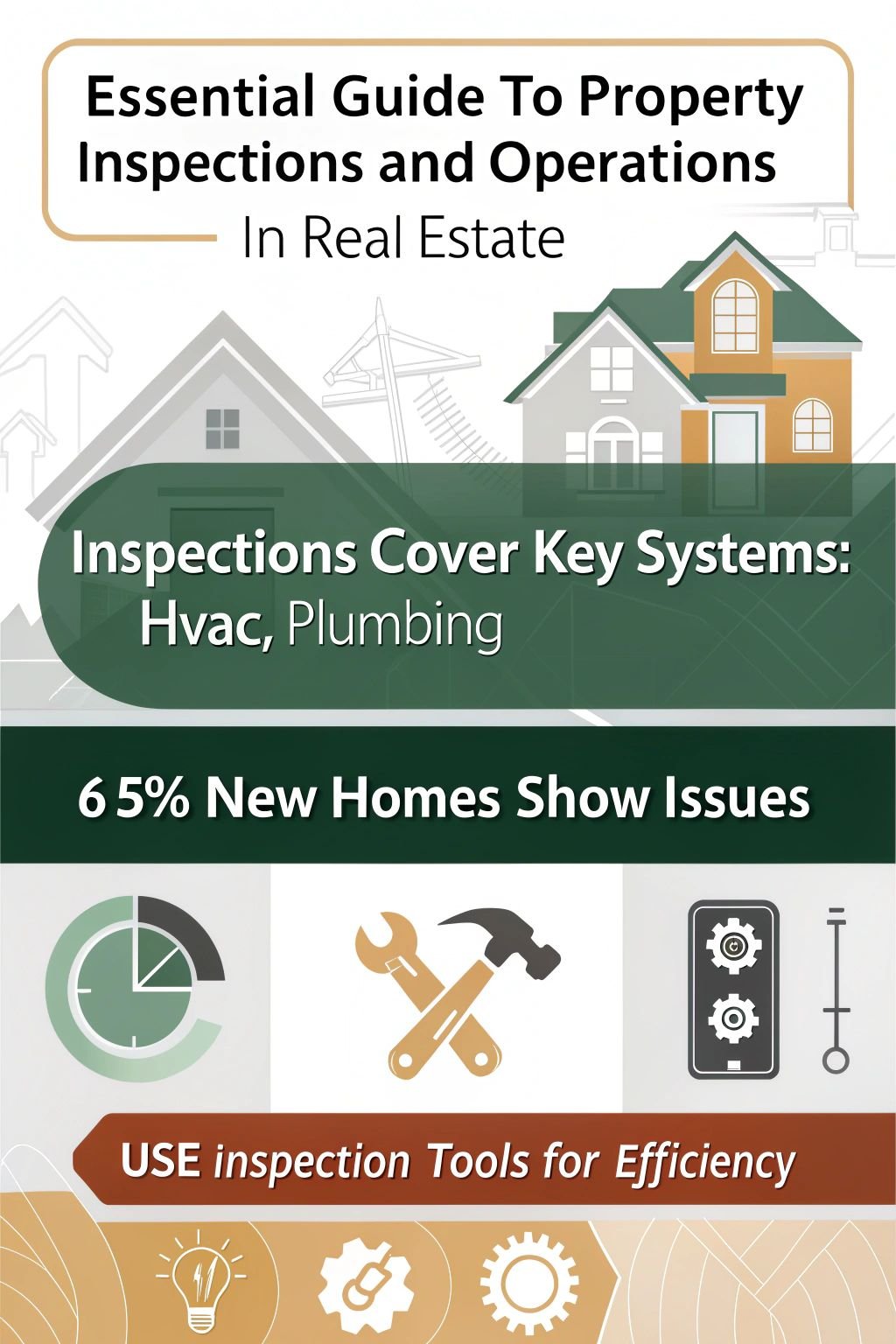Buying a home can be exciting. Figuring out property inspections can be stressful. You need to know the house is in good shape. National Property Inspections (NPI) has over 35 years of experience.
They know inspections. This guide will help you understand property inspections. You will learn about home inspections. 2 You will learn about rental inspections too. 1 Read on to learn more. 3
Key Takeaways
- Property inspections are crucial for real estate decisions. They assess a property’s condition, covering structure, HVAC, plumbing, and electrical systems.National Property Inspections (NPI), with over 35 years of experience, uses advanced technology for inspections.
- Various types of inspections exist. Home inspections, costing $300-$500, protect buyers. 65% of new home inspections find problems, with 24% failing the first inspection. Rental inspections, aided by software like Buildium and AppFolio, maintain properties and boost tenant satisfaction. Foreclosure inspections help assess repair costs.
- Thorough inspections cover interior and exterior elements like roofing, foundation, siding, and windows. They also evaluate mechanical and structural integrity, including plumbing, electrical, and HVAC systems.Technology, like inspection software and remote virtual tours, enhances the process.
- Streamlined property operations boost property value by catching maintenance needs early and increase tenant satisfaction through quick responses and clear communication.Choosing the right inspection service involves verifying qualifications, certifications, and checking reviews.
- Challenges include detecting hidden problems like foundation issues or water damage and balancing inspection costs with compliance needs.Hiring licensed professionals and using property inspection software helps manage costs and ensure compliance.

Understanding Property Inspections in Real Estate

Property inspections are crucial for real estate decisions. They offer a detailed assessment of a property’s condition. Think of it like a health checkup for your potential investment.
National Property Inspections (NPI), with over 35 years of experience, knows this well. They inspect thousands of homes and commercial properties every year. NPI uses advanced technology for these inspections.
This helps you understand the true state of the property. You gain insight into potential problems and necessary repairs. A professional home inspection protects your investment. It gives you peace of mind.
It helps you make informed choices.
Inspections cover various aspects. These include the home’s structure, HVAC system, plumbing, and electrical systems. The inspector uses a checklist and creates a detailed inspection report.
This report highlights any issues. It gives you a clear picture of the property’s condition. This information is essential for home buyers and investors. It helps you negotiate repairs or adjust the offer price.
NPI serves homebuyers, sellers, and commercial property investors. They understand the importance of a thorough inspection. A complete guide to the inspection process prepares you.
It empowers you to make smart decisions.
An investment in knowledge pays the best interest. – Benjamin Franklin
Various Types of Property Inspections
Property inspections are like health checkups for your investments. From pre-purchase evaluations to routine maintenance checks, different inspections serve unique purposes. Learn how these assessments, like those using Buildium or AppFolio Property Manager, safeguard your real estate ventures.
Exploring Home Inspections
As a home buyer, you need a home inspection. It’s a critical part of the home buying process. Think of it like a check-up for the house. A certified home inspector examines the property’s condition.
They use a home inspection checklist. This covers major systems. These include roofing, electrical, plumbing, and HVAC. A home inspection typically costs between $300 and $500.
Home inspections protect your investment. They uncover hidden problems. Common issues include structural damage and outdated electrical panels. Plumbing problems and HVAC malfunctions are also common.
Even new homes have issues. A surprising 65% of new home inspections find problems. 24% of new homes fail the first inspection. The home inspection report details the home inspector’s findings.
This report helps you make informed decisions. You can negotiate repairs with the seller. You can also back out of the home purchase. A home inspection is an important step. It safeguards your investment.
Now, let’s examine rental property inspections.
Assessing Rental Property Inspections
Beyond the home inspection for your dream house, consider rental property inspections. These regular inspections are vital for property management. They help maintain the property and find problems early.
Routine inspections help you, the investor, boost property value and increase tenant satisfaction. Common issues found during inspections include structural problems, maintenance issues, safety hazards, and cosmetic concerns.
These inspections should be conducted by property managers, landlords, or certified home inspectors. 6 Landlords must provide tenants with 24 to 48 hours’ notice before inspections.
This respects tenant rights and ensures a smooth process. Think of these inspections as a check-up for your investment. They protect your property and ensure it remains in good condition.
You’ll need this information for your Real Estate Rank iQ.
Property operations software like Buildium and AppFolio can streamline these inspections. They help document issues and track repairs. 5 This detailed record helps with property maintenance and tenant communication.
These tools can also automate scheduling and reminders. This makes the inspection process more efficient for everyone. A smooth inspection process helps keep your tenants happy and your property in top shape.
This also contributes to a positive landlord-tenant relationship. Remember, happy tenants are more likely to renew their leases.
Regular property inspections are not just a good idea, they’re a crucial part of successful property management. – Property Management Expert
Reviewing Foreclosure and Default Inspections
From tenant occupied properties to vacant homes, inspections play a vital role. Foreclosure and default inspections offer a unique look. These inspections reveal the true condition of a property.
Think of it like a behind-the-scenes peek. You see the home’s actual state. This type of inspection is crucial for both buyers and investors. Foreclosure inspections help you understand potential repair costs.
This knowledge empowers you to make informed decisions. You can better assess the property’s value. A typical home inspection costs between $200 and $400. Inspections usually take two to four hours.
This information helps you budget your time and resources. Services like Zillow and Redfin offer valuable resources for finding foreclosed properties. They can connect you with real estate professionals.
These professionals can guide you through the foreclosure inspection process. You gain a clearer picture of the property and ensuring you’re making a smart investment.
You can use the inspection report to negotiate. You might ask the seller for repairs. You could also request seller credits. This can offset your repair costs. This leverage is valuable in the home buying process.
A home warranty can also offer protection. It covers certain repairs after you buy the home. Consider a home warranty as an added layer of security. Remember, a thorough inspection is key.
It helps protect your investment.
Essential Elements of Property Inspections
From leaky faucets to faulty wiring, the core of any property inspection lies in scrutinizing its interior and exterior, ensuring its structure and systems are sound, much like how Sherlock Holmes examines a crime scene for clues.
Want to know more? Read on!
Assessing Interior and Exterior Conditions
Smart home buyers and investors know property inspections are crucial.Thorough inspections cover every detail, inside and out.
- Roofing:Inspectors check for missing shingles, leaks, and proper ventilation.This protects your potential home from water damage.Think of your roof as a shield against the elements.
- Foundation:Inspectors look for cracks, settling, and drainage issues.A solid foundation is essential for structural integrity. Foundation problems can be costly to repair.
- Siding:Inspectors examine the siding for damage, rot, and pests. Siding protects your home’s exterior walls.It also adds to curb appeal.
- Windows and Doors:Inspectors check for proper sealing, functionality, and energy efficiency.Well-sealed windows and doors save you money on energy bills. They also keep your home comfortable.
- Decks/Patios:Inspectors assess the structural soundness, railings, and overall condition. Safe decks and patios are essential for outdoor enjoyment.
- Gutters and Landscaping:Inspectors check for proper drainage and grading.This prevents water from pooling around your foundation.Proper drainage protects your property from water damage. 8
- Interior Walls and Ceilings:Inspectors look for cracks, water stains, and signs of mold. These can indicate hidden problems.
- Plumbing:Inspectors check for leaks, water pressure, and proper drainage.They’ll also examine water heaters and fixtures.
- HVAC System:Inspectors assess the heating and cooling systems.They’ll check for proper function and efficiency.
- Electrical System:Inspectors examine the wiring, outlets, and electrical panel.They’ll look for safety hazards.
- Appliances:Inspectors may check major appliances like ovens, dishwashers, and refrigerators.They’ll make sure they’re working correctly.
These detailed checks give you a complete picture of the property’s condition. This knowledge helps you make informed decisions.A thorough home inspection process is key to a successful home purchase.
Evaluating Mechanical and Structural Integrity
From the cosmetic appeal of interiors and exteriors, your focus should now shift to the core strength of the property: its mechanical and structural integrity.This crucial step ensures your investment remains sound for years to come.Here’s your checklist:
- Foundation Inspection:Check for cracks, settling, and other signs of damage.A solid foundation is essential for the entire structure. Think of it as the bedrock of your investment, much like the principles of Risk assessment in OSHA Regulation 1910.119.
- Roof Examination:Inspect the roof for missing shingles, leaks, and proper drainage.A damaged roof can lead to costly repairs down the line. This is as crucial as maintaining your Corrosion Control Documents (CCDs) for process equipment.
- Plumbing System Check:Look for leaks, water pressure issues, and proper drainage.A functioning plumbing system is key for comfortable living.It’s like the flow of information in a well-managed property, vital for smooth operations.
- Electrical System Evaluation:Inspect the electrical panel, wiring, and outlets.Ensure the system is safe and up to code. This aligns with the principles of Mechanical Integrity (MI) for managing critical equipment, as mandated by OSHA.
- Heating, Ventilation, and Air Conditioning (HVAC) System Assessment:Examine the HVAC system for proper function and efficiency.A comfortable indoor climate is vital, much like a well-maintained work environment for employee safety.
- Structural Components Review:Inspect walls, floors, and ceilings for any signs of damage or weakness.These components provide the skeletal framework of your property.They are as important as the training programs designed to uphold mechanical integrity within a facility.
- Appliance Check:If appliances are included in the sale, ensure they are in working order.This can save you from unexpected expenses after closing.It’s comparable to ensuring all safety devices are functional before operating critical equipment.
- Safety Devices Inspection:Check smoke detectors, carbon monoxide detectors, and fire extinguishers.These are crucial for the safety of occupants, similar to emergency shutdown systems in industrial settings.
- Pest and Insect Inspection:Look for signs of pests or insects.These can cause damage and health concerns.This is comparable to preventing corrosion in process equipment, a key aspect of mechanical integrity.
Integrating Technology into Property Inspections
5. Integrating Technology into Property Inspections: Drones and property inspection software are changing how we look at houses, much like how Marty McFly’s hoverboard changed transportation in “Back to the Future.” Want to know more? Read on!
Utilizing Inspection Software Tools
Property inspection software modernizes home inspections. 10 These digital tools boost productivity and accuracy. Cloud storage keeps inspection data safe. You can quickly document the condition of the property.
Take photos and make notes. The software creates reports for you. This streamlines the home buying and selling process, offering buyers an opportunity to assess the exterior and interior.
Now, let’s explore remote inspection options.
Advancing with Remote and Virtual Inspection Techniques
Imagine touring a potential investment property from your couch. Remote inspections make this a reality. These inspections use video calls and live streaming. You can see the property in real-time.
The Covid-19 pandemic sped up this tech adoption. This helps buyers and investors. Think of it as a virtual home inspectors look. You can even get a remote move-in inspection.
Hybrid inspections mix on-site and remote views. Augmented reality adds another layer. AR overlays digital data onto the real world. This gives you more information during your inspection.
This tech helps with the home inspection contingency. You can find a home inspector who offers these services. This can save you time and money. Now, let’s explore the benefits of streamlined property operations.
Advantages of Streamlined Property Operations
From boosting your property’s curb appeal like Chip and Joanna Gaines to keeping your tenants happy as clams, slick property operations are your golden ticket to real estate success.
Want to know more? Keep reading!
Boosting Property Value
Regular property inspections are key to boosting your property’s value. They help you catch maintenance needs early. This preserves your investment. Think of it like regular car maintenance.
You address small issues before they become big, costly repairs. Timely repairs keep your property in good condition. This increases its market appeal for potential buyers. A well-maintained property attracts higher offers.
It also satisfies tenants, encouraging longer leases. Annual inspections are sometimes required for insurance. These checkups protect your investment and increase its worth. Consider home inspections as a vital tool.
They help maximize your return. They contribute to a positive cash flow. This is good for both home buyers and investors.
Increasing Tenant Satisfaction
Happy tenants mean fewer vacancies. Fewer vacancies mean steady income for your investment property. You want reliable renters. Focus on proactive property management. Quick responses to maintenance requests show you care.
Clear communication about lease terms builds trust. Think about using tenant surveys. Surveys gather feedback. This feedback helps you improve your management style. Better management leads to higher tenant satisfaction.
Higher tenant satisfaction boosts your property value. This also makes your property more attractive to future renters. 13
.
Selecting the Ideal Property Inspection Service
Finding the right inspector is like casting Sherlock Holmes for your house hunt – you want a keen eye and attention to detail. Intrigued? Read on to discover more about property inspections.
Verifying Qualifications and Certifications
Choosing the right home inspector is crucial for your property inspection.Confirm their qualifications and certifications to ensure a thorough inspection.
- Check State Licensing:Verify licensing requirements for home inspectors in your state.Each state has different rules.This protects you. 14
- Look for Certifications:Seek certifications from reputable organizations.These groups include InterNACHI (International Association of Certified Home Inspectors), ASHI (American Society of Home Inspectors), and NIBI (National Institute of Building Inspectors).Certifications show the inspector has met high standards.
- Verify Insurance:Confirm the inspector carries professional liability insurance.This insurance protects you if the inspector misses something during the home inspection. It covers errors or omissions.
- Check Reviews and References:Positive reviews and references are key.They indicate a qualified and trustworthy home inspector.Look for reviews on sites like Yelp or Google.Ask the inspector for references.
Considering Reputation and Reviews
Due diligence is key when selecting a property inspection service.A company’s reputation speaks volumes about its service quality.
- Check Online Reviews: Explore platforms like Yelp, Google Reviews, and Angie’s List.Look for consistent positive feedback about the inspector’s thoroughness, communication, and professionalism.A stream of happy home buyers and investors is a good sign.
- Seek Referrals: Tap into your network. Ask your real estate agent, friends, or family for recommendations.Personal experiences offer valuable insights into an inspection company’s strengths and weaknesses.
- Verify Licensing and Insurance:Confirm the inspection company’s credentials.Ensure they hold the necessary licenses and insurance in your state.This protects you from liability.Compliance with state regulations is crucial.
- Assess Experience and Expertise:Inquire about the inspector’s experience.How long have they been in the business? Do they specialize in certain property types, like single-family homes or commercial buildings?Experience matters, especially for complex inspections.
- Evaluate Communication Skills:A good inspector communicates clearly and effectively.They should explain their findings in a way you understand.They should also be readily available to answer your questions before, during, and after the inspection.
- Review Sample Reports: Ask for sample inspection reports.This gives you a preview of their work.Look for detailed descriptions, clear photographs, and easy-to-understand summaries.
- Compare Pricing and Services:Get quotes from multiple inspection companies.Compare their pricing and the services they offer.Don’t automatically choose the cheapest option.Focus on value and a comprehensive inspection.A thorough inspection can save you money in the long run.
A well-chosen inspection service ensures a smooth home buying process.Now, let’s explore the potential challenges you might face during property inspections.
Navigating Challenges in Property Inspections
8. Finding hidden problems and managing inspection costs can be tricky, so read on for expert advice to make it easier.
Detecting Hidden Problems
Uneven paint or wall cracks could mean foundation problems. Check for these during your property inspection. Foundation issues can be costly. You want to catch them early. A home inspection is important.
Stains on walls or odd odors might indicate water damage. Water damage can impact the property remains. Look closely for these signs during the interior inspection. These concealed problems can affect the size of the home’s value.
Consider a specialty inspection for a more thorough assessment. This is especially important when buying a house. Temperature imbalances can reveal insulation issues. This can affect your energy costs.
A professional inspector can help you identify these problems. Their checklist and report will detail their findings. You should be present during the inspection of the property. Ask questions about the inspection results.
This home inspection could save you money in the long run. Home inspections are an important part of buying a home. The cost of a home inspection is worth the investment. It protects your investment.
This applies whether you plan to buy a home or work with a property management company.
Balancing Costs and Compliance
Property inspections maintain asset values. They also ensure compliance. You must balance these two factors. Efficient inspections manage costs. They also meet requirements. Think of it like a home inspection before a sale.
You want a good deal. You also want a sound house. Licensing and certification are key. Avoid fines by hiring pros. Property inspection software streamlines compliance. It also reduces operational costs.
This helps you stay within budget. It also keeps you legally sound. Like a home appraisal, a thorough inspection protects your investment. Consider this when you prepare for a home inspection.
Professional inspectors offer valuable insights. They can find hidden problems. They help you balance costs and compliance. This is true for both buyers and investors.
Conclusion with 3 pro Tips
Smart inspections build real estate success. Regular assessments protect your investment. Use software like Buildium or AppFolio to streamline operations. Ask inspectors about their certifications and experience.
Thorough inspections save you money and stress in the long run. Remember these tips for a smooth real estate experience. Now go find your dream property!
FAQs
1. How long do home inspections take?A home inspection usually takes two to four hours.The size of the property matters. Larger estates take longer.Just like on HGTV, sometimes extra issues pop up and add time.
2. What happens on inspection day?The buyer’s inspection is a key part of the home sale.The home inspection generally covers all major home components.Exterior and interior areas are checked.The inspection is typically scheduled after the sales agreement is signed.
3. What if the inspection reveals problems? The results of a home inspection can impact the deal.The home inspector may find issues.Buyers choose how to proceed. They might ask the seller to make repairs.Sometimes, the home sale falls through due to inspection findings.
4. What do home inspectors look for?A common inspection includes checking the roof, plumbing, and electrical systems. The average home inspection also covers heating and cooling.Home inspectors offer different types of inspections. Specialty inspections, like for pests, may be needed.
5.Who needs to worry about inspections? Inspections are important for both buyers and sellers. Buyers use inspections to understand the property’s condition.Landlords and property managers use inspections to maintain their buildings. Inspections provide valuable information for everyone involved. Inspections must be done thoroughly.
6.Who performs these inspections?Buyers and sellers don’t do the inspections themselves.Hire a professional home inspector. Home inspections take specialized knowledge.Inspections may require several hours to complete, depending on the size of the property. Home inspectors offer a trained eye and detailed reports.
References
- ^ https://www.tenantcloud.com/blog/property-inspection (2024-10-31)
- ^ https://www.nar.realtor/home-inspections
- ^ https://americandreampropertyinspections.com/the-essential-guide-to-home-and-property-inspections/ (2024-08-20)
- ^ https://www.healthyhomeinspectionsfl.com/types-of-home-inspections-complete-guide (2024-09-13)
- ^ https://www.tenantcloud.com/blog/how-to-inspect-a-rental-property (2024-04-15)
- ^ https://www.doorloop.com/blog/rental-property-inspection (2024-08-16)
- ^ https://www.classhomeinspection.com/the-complete-guide-to-foreclosure-inspections/
- ^ https://www.myaccuratehomeservices.com/exterior-components-of-a-home-inspection-essential-insights
- ^ https://inspectioneering.com/tag/mechanical+integrity
- ^ https://singu.com/why-you-really-need-a-property-inspection-software-in-2024/
- ^ https://avatour.com/article/remote-inspections-overview
- ^ https://bfpminc.com/why-property-inspection-are-so-important/
- ^ https://www.mrisoftware.com/blog/expectations-residential-property-management-enhancing-tenant-satisfaction/
- ^ https://gchomeinspection.com/how-to-choose-a-home-inspector-qualifications-you-need/ (2024-11-15)
- ^ https://www.protec-inspections.com/choosing-the-right-inspection-company-key-factors-to-consider
- ^ https://www.steadfastmortgage.com/blog/navigating-home-inspections-a-buyers-guide-to-uncovering-hidden-issues (2024-02-21)
- ^ https://www.pointmtg.com/blog/navigating-home-inspections-a-buyers-guide-to-uncovering-hidden-issues (2024-02-21)
- ^ https://blog.snapinspect.com/navigating-legal-and-ethical-challenges-in-property-inspections/





















